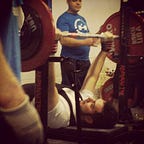Now Is the The Time to Learn Another Language
Language is the foundation of culture.
Its not food.
Its not clothes.
Its not going out to the American Chinese takeout place round the corner for some ‘culture’.
Its language.
Its language that spearheaded the rise of great empires. Its language that helped facilitate the spread of information and acted as a doorway for new experience, and ultimately answers to confounding problems.
Heck, its language that can help bridge the divide across the generations, races, and genders.
Why leave your Skill at only one Language?
We’ve talked several times about finding a common language to branch out from. Even when it comes to languages of different industries and sciences.
There’s a lot a person can take from just the squat exercise in order to explore different languages of movement.
But what’s the point in knowing a common language when you don’t use it to explore new ones?
Look what you’re missing out on:
Imagine how someone like Alexander would have fared if he didn’t have access to people knowledgeable of different languages in his quest for world conquest?
Do you think he’d conquer through Greece, Persia, Egypt, and India without having access to people who spoke many languages?
How would Buddhism and Yoga find their way back to Greece?
It wasn’t through Google Translate. That’s for sure.
Are you a One-Hit Wonder?
Looking through the world, its very small view to just look at it through only one language. Its like you living at home all day. Its like discovering 20 rep squats but ONLY doing them. EVER.
Its like doing Mark Rippetoe’s beginner’s Starting Strength Program (probably one of the best programs you can do as a beginner barbell strength trainee), making progress in the general area of size and strength, but failing to realize that the program heavily under-emphasizes upper body muscular development.
Its being unaware that for long-term progress, you need to adapt.
Failing to adapt leaves you un-balanced.
You’re missing out on the power of upper body strength.
Similarly, missing out on other languages can keep you unaware of powerful tools for your purpose.
Taking Lingua Franca to a literal place,
Same ways in learning history, you can’t expect all of history to be accurately written in one language. That’s a lot of trust being put in A LOT of people.
In their essay called Issues and Challenges in Translating Historical Texts, Helen Glanville and Murtha Baca mention the problems that come with translation, especially of historical writing that we, in the modern world use to understand the worldview of the past:
Translation always represents a shift not only between two languages but also between two cultures. A translator must take into account factors that are linguistic or semantic as well as, broadly speaking, cultural.1 Every translation is, to a greater or lesser extent, also an interpretation.
Makes you wonder then how much culture can impact the words that we use and how we see ‘deciphering’ something from another language.
And this isn’t something exclusive to fitness or historical research. In the ever-present world of scientific research, the impact of language and the bias of English-speakers is something we don’t often think about.
In an article published last year in Smithsonian Magazine, journalist, Ben Panko recollected the statements of University of Cambridge zoologist, Tatsuya Amano. As a Japanese native, Amano highlighted that it is assumed by native-English researches that all relevant research is already in English.
He points out that he sees studies being overlooked, presumably over them not being written in English. Although this is presumptive, it does make you think about how much information is ‘presumed’ to be investigated.
Now, if non-native English speakers just learned English, this challenge could easily be overlooked. However, doesn’t that possess another language bias?
Ultimately the article pointed out a recommendation by another scientist interviewed by Panko. Scott Montgomery, a geologist at the University of Washington and investigator of communication in science tells Panko:
Scientists in all fields would benefit from learning another language, Montgomery says — including native English speakers. But he believes that the best solution to science’s language barrier is encouraging scientists worldwide to study English.
Its 2018. Learning a New Language has Never Been Easier.
Obviously its not E-A-S-Y.
But with immersive programs like Rosetta Stone to simple apps such as Duolingo or Busuu, the resources for learning a foreign language are much more substantial than they once were.
Taking the same ‘power of the process’ that you attain from physical training its amazing to see persistence and consistency pay off in learning language.
Personally, having learned French in school wasn’t very effective for me and I gave up.
Taking to learning it again with more of an intrinsic motivation (being able to read French writings on history) its an awesome experience to finally make some sense of words that previously looked like gibberish.
At that point, you have a renewable source of motivation, as the more I’m adhering to the consistency, the greater the competency, and greater confidence.
Appreciating the purity of Meaning
Just like how learning the language of anatomy can enhance your fitness, learning a new language can enhance your understanding of history and different people.
In that vein, I hope you find a language that is fascinating or a culture or peoples that interest you.
Learn their language.
Read their books.
Consume their values, motivations, and worldview.
